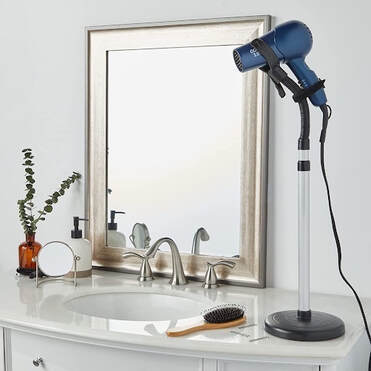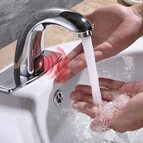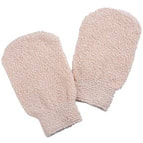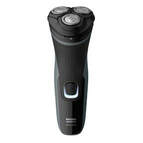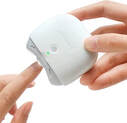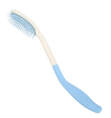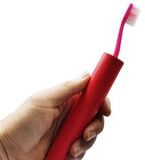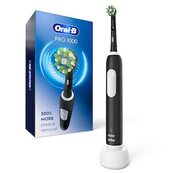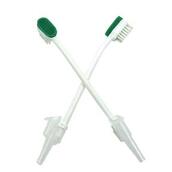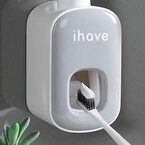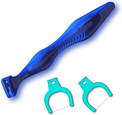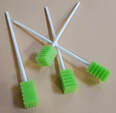|
Modifying the way you do things and using assistive devices can help you save energy and continue to do activities on your own. As ALS progresses, you may notice that everyday activities like combing your hair or brushing your teeth are becoming more challenging. There are a number of strategies and devices that can help you continue to perform these tasks independently, while saving energy. The occupational therapist at your ALS clinic, outpatient occupational therapy, or home health agency should be able to assess your challenges and make individualized recommendations for you. |
Grooming and Personal Hygiene Activities
|
It is important to have a sturdy place where you can sit down and access the things you need in your bathroom. This might be a chair, wheelchair, rolling shower chair, or even the seat on your four-wheel walker or rollator. If you are sitting on something with wheels, be sure to lock the wheels or engage the brakes.
It can also be helpful to rest your arms on the counter if they feel tired or weak when you are doing things like shaving or brushing your teeth. |
|
Here are some assistive devices that may help you with grooming activities:
|
If you are having a hard time operating the sink, you could install a touchless faucet or make modifications like adding knob adapters or replacing knobs with levers.
|
|
|
If you are having trouble holding onto a washcloth, you can try using a bath mitt or even two washcloths sewn together that form a pocket for your hand.
|
|
|
If you are unable to safely use a regular disposable razor, you can try using a lightweight electric razor instead.
|
|
|
If you are having trouble cutting your nails, there are electric nail clippers as well as manual clippers on suction cup mounts.
|
|
|
If brushing your hair is challenging, there are thick-handled and long-handled brushes as well as brushes with loop straps that make them easier to hold.
|
|
|
|
|
Modifying the way you do your grooming activities and using assistive devices like these can help you save energy and continue to do these tasks on your own for longer.
If you notice that certain activities are taking longer than normal or are using more energy, you can ask your caregiver for help. Whether you do these activities independently or with assistance, it is important to continue to take care of your body and practice good hygiene. |
|
|
If you attend an ALS Clinic or are connected with a local ALS organization, ask if they have grooming devices you could try before deciding to purchase them. You can also visit our Grooming Devices page to learn more and purchase them directly.
You can learn about bathing and showering options on our Bathing page. |
|
Equipment Loan ClosetsYou can potentially save thousands of dollars by borrowing equipment from ALS loan closets. Many local ALS organizations and clinics loan certain types of assistive devices and medical equipment at no cost. Learn more |
|
Oral Hygiene and ALS
|
Maintaining good oral hygiene is important for everyone, but it is especially important for people living with ALS. Unaddressed plaque and bacteria growth can lead to gum disease, thrush (an oral yeast infection), respiratory infections, and other issues.
If maintaining good oral hygiene is becoming challenging, share your concerns with your neurologist, speech language pathologist, or occupational therapist. You can also ask your dentist for suggestions. If going to the dentist’s office is inconvenient or not possible, find out if there is a mobile dentist in your area who could come to your home. |
|
|
Here are some assistive devices that your occupational therapist may recommend to help you with oral hygiene:
|
|
|
If you have arm strength but are having trouble gripping a regular toothbrush, you can try wrapping foam tubing or anything else around the handle to make it easier to grip. If you can’t grip the larger handle, you can slip your toothbrush into a universal cuff.
|
|
|
If you are having trouble cleaning your teeth well with a manual toothbrush, or find it tiring, you can try using an electric toothbrush as long as it does not feel too heavy.
|
|
|
If you are choking on saliva and toothpaste while brushing, you can connect a suction toothbrush to your suction machine to prevent saliva and toothpaste from pooling in your mouth.
|
|
|
If you are struggling to get toothpaste out of the tube, you can try using a toothpaste dispenser.
|
|
|
If flossing is challenging, try using a flosser with a handle. If the flosser is hard to hold, you can add foam tubing or anything else to the handle to make it easier to grip.
|
|
|
Oral mouth swabs can help by gently massaging your gums, moistening your dry mouth, and removing bits of food, plaque, and excess fluids.
|
|
Other things that you may find helpful for maintaining good oral hygiene include Biotène Dry Mouth Oral Rinse, water pics, and electric tongue cleaners. You may need to look around for the right devices that will meet your specific needs. Ideally, they will be lightweight, portable, and easy to use.
Modifying the way you do oral hygiene activities and using assistive devices can help you save energy and continue to do these tasks on your own for longer. However, if you notice that certain activities are taking longer than normal or are using more energy, you can ask your caregiver for help. Whether you do these activities independently or with assistance, it is important to continue to maintain good oral hygiene.
Modifying the way you do oral hygiene activities and using assistive devices can help you save energy and continue to do these tasks on your own for longer. However, if you notice that certain activities are taking longer than normal or are using more energy, you can ask your caregiver for help. Whether you do these activities independently or with assistance, it is important to continue to maintain good oral hygiene.

